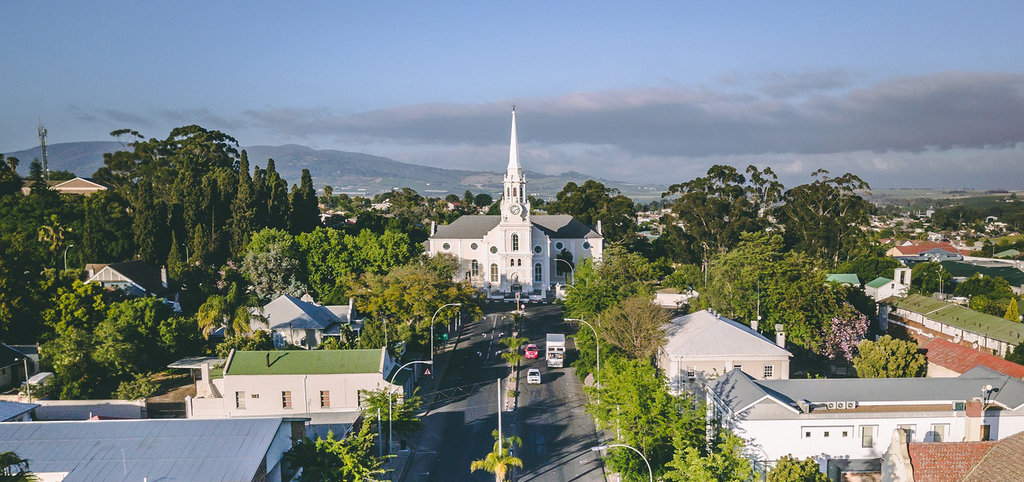
explore the area
wellington
This town, hard up against the Limietberg range, was founded about the time (circa 1800) British rule displaced Dutch at the Cape, hence the name – along with the likes of nearby Worcester and Wolseley.
by David Bristow
Dominating the town, other than the Limietberg range rising beyond, is the white-steepled “Boere Baroque” Dutch Reform Church with a stature of Andrew Murray seated outside, looking down the main street towards those blue-grey mountains.
Murray was one of several Scottish Calvinist ministers brought to the Cape by the British colonial authority in order to tend to the Dutch as well as the French descended Protestant flock of the “boland” (the high country, pretty much synonymous with the Cape winelands), in English.
Murray is venerated for being extremely sympathetic to the plight of the rural people, as much as for starting the seminary which became the seat of learning for women in South African long before it was considered appropriate to educate the future wives of farmers. Many of the historical buildings in town are associated with the Murray institution.

Dating back to 1699 Val du Charron’s wines are available worldwide but are best enjoyed surrounded by the vineyards themselves
For historical reasons (mountain biking history rather than any other kind), a trip to tackle the Wild Boar trails is something of a pilgrimage for Cape riders. Four trails range from moderate to extreme, starting and ending at the very rustic Ou Meul (the old mill) coffee shop, which works on an honesty system.
The farm has been in the Retief family for more than 300 years and is where the business of making wagons began in the region: the valley was at one time known as Wagenmakersvallei. The French settlers called it Val du Charron, which is remembered in the wine farm of that name. For the other kind of history it was also the birthplace of the famous Voortrekker (pioneer) Piet Retief leader who helped forge a trail into the interior of South Africa in the 1830s.
For historical reasons (mountain biking history rather than any other kind), a trip to tackle the Wild Boar trails is something of a pilgrimage for Cape riders.
Like many notable people in history he is most remembered for having been killed. In his case it was together with his entourage when they were summonsed to parley with the Zulu king Dingaan about being granted land on which to settle in his kingdom … ’nother story. Part of the current story though, is that Welvanpas also caters for trail runners and day hikers.
For those seeking a somewhat more leisurely ride but no less picturesque landscapes, the Wild Boar Trails take one across surrounding farmlands. All six routes start and end at the Val du Charron (valley of wagonmakers) estate.
Another Scotsman who is acclaimed in these parts is one Andrew Geddes Bain, saddler, explorer, journalist, failed farmer, geologist, rail and road engineer, palaeontologist and poet. You can bet he could fix his own wagon. In fact Wellington grew up around the railhead he was tasked with forging inland from Cape Town around 1840. That led to many road-building commissions from the Cape Government and British Army.

Bainskloof Pass is a favourite amongst
cyclists visiting Wellington

Wellington prides itself on its
incredible wines and views to match
His crowing achievement was overseeing the building of Bainskloof over the Limietberg behind town. Incidentally, this pass opened up the way into the Tulbagh valley, the last stop on our Cape Epic visit.
Once again it is at the various wine farms that you’ll find the best eating options (bearing in mind some of them don’t offer dinner). In fact Wellington is, in our opinion, the best off-the-beaten-track wine area to explore with numerous less known estates devoid of the tourist throngs you trip over in the more popular regions (namely Stellenbosch, Franschhoek, and to a lesser extent Paarl).
Our insider’s tip is to explore the Bovlei Division Road and see what you find. For the full South African experience try the Pinotage (red) and Chenin Blanc (white) options wherever you find them.

Wellington's economy is centred on its award-winning wines, table grapes, deciduous fruit and it is also home to South Africa’s sole whisky producer
Photos courtesy: Wellington Wine and Tourism